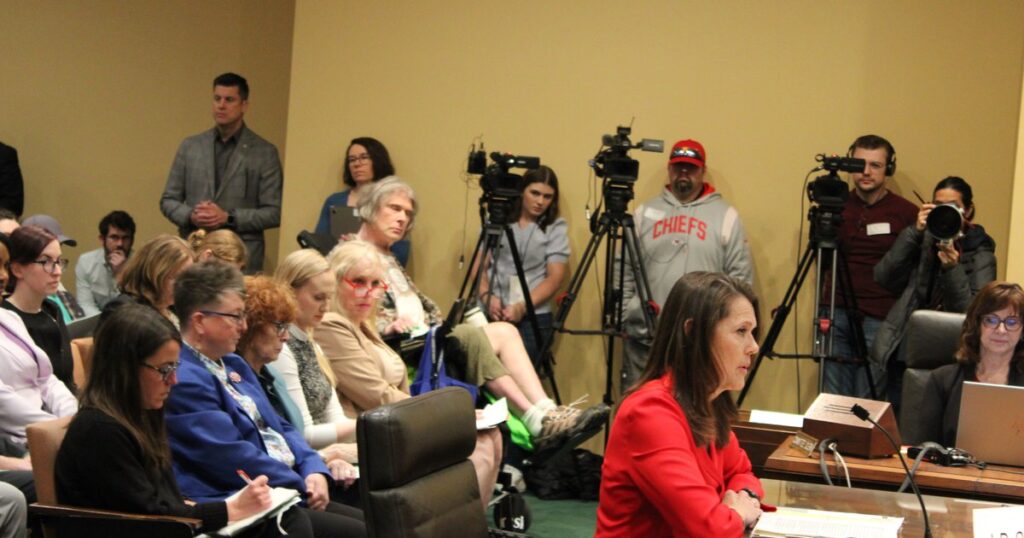Debate Over Legislative Proposal on Transgender Athlete Participation
In Nebraska, a legislative proposal has sparked significant public discussion regarding the participation of transgender athletes and their access to facilities such as locker rooms and bathrooms. The proposal, heard by the Legislature on Friday, aims to restrict transgender individuals to using facilities that correspond to their sex assigned at birth.
The proposal, introduced by Sen. Kathleen Kauth, is encapsulated in LB89. Kauth underscored the necessity of the legislation during the hearing with the Government, Military and Veterans Affairs Committee, highlighting its role in preserving the integrity of sports and ensuring privacy.
“LB89, also known as the Stand with Women Act, is a crucial piece of legislation that aims to protect the integrity of athletic competitions and ensure the safety and privacy of women and girls in schools and state agencies,” Kauth stated.
Beyond affecting schools and colleges, the proposed legislation would require state agencies to classify individuals strictly as male or female. Kauth argued that this would prevent scenarios such as biological males being housed in women’s prisons.
During the hearing, Sen. John Cavanaugh questioned Kauth about her perspective on transgender individuals, asking, “Is it your opinion that people with — that trans people have a mental disorder?” Kauth responded affirmatively.
This viewpoint was met with strong opposition from Jessie McGrath, a transgender woman who testified. McGrath expressed her pride in her identity, saying, “Why is my freedom and trans joy so scary to so many of you people? I really would like to know that.”
McGrath elaborated on her experience, stating, “I consider my being trans to be an incredible gift from God. I am blessed because I am able to see things through the world in two completely different ways.”
The hearing also focused on the bill’s practical implications, receiving endorsement from Gov. Jim Pillen. “Who are we if we’re not willing to create protection for girls, young women and women by simply acknowledging that they deserve the courtesy of having privacy in a bathroom or a locker room?” Pillen questioned.
Offering a personal perspective, former Connecticut high school athlete Selina Soule described her experiences competing against transgender athletes. “I lost countless opportunities during my time as a high school athlete,” Soule stated, recounting specific instances of lost chances due to the participation of transgender competitors.
While the Nebraska State Activities Association recorded only eight applications from transgender athletes since 2018, Greg Brown, an exercise science professor at the University of Nebraska Kearney, supported the bill, arguing that the number is irrelevant. “You will hear lots of people say that it’s only a few trans women competing in women’s sports…That acknowledges that there is, in fact, a difference between males and females,” Brown said.
In opposition, Omaha Board of Education President Jane Erdenberger questioned the motivations attributed to transgender individuals. “I just find it hard to believe that someone would go through the challenges and the frankly disrespect in being called mentally ill…to be able to play volleyball,” she remarked.
Erin Feichtinger from the Women’s Fund of Omaha also critiqued the bill, arguing it does not support women. “There are many policies that protect and advance the wellbeing of women and girls in our community. LB 89 is not one of those policies,” Feichtinger stated.
Abbi Swatsworth of Out Nebraska raised concerns about the enforcement of restroom restrictions. “Under this law, any person, including a woman, could be forced to show her ID or otherwise prove her gender before entering a restroom,” Swatsworth warned, labeling the bill as an invitation for potential abuse.
The bill, if it progresses from the committee stage, would require a substantial majority—33 out of 49 votes in the Legislature—to override any filibuster and become law.





